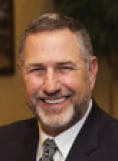Dr. Joel C. Small discusses ways to increase practice potential through awareness
Blind spot: One’s prejudice, or an ignorance that is beyond his/her field of awareness.
Self-limiting belief: A personal prevailing belief that prevents the development or expression of one’s self.
“Most ailing organizations have developed a functional blindness to their own defects. They are not suffering because they cannot resolve their problems but because they cannot see their problems.” ~John Gardner
 Several years ago I developed the tagline “Line of Sight Leadership,” which referred to leaders’ ability to develop a clear and un-
Several years ago I developed the tagline “Line of Sight Leadership,” which referred to leaders’ ability to develop a clear and un-
obstructed vision of where they (and their organization) are now and where they want to be in the future. It is this high degree of clarity that allows leaders to identify and ultimately remove the barriers and/or obstructions that block the path to our predetermined goal. At the time, I saw these barriers as tangible items that acted as restraints to our progress and achievement. That has all changed since my introduction to professional coaching. I now believe with certainty that the most daunting barriers to achieving our predetermined goals are not tangible at all. In fact, they are blind spots and self-limiting beliefs that remain unrecognized and undermine our ability to pursue our aspirations.
It goes without saying that no degree of knowledge, skill, or self-efficacy can remove a barrier that is unrecognized. So how can we overcome an unrecognized barrier? Furthermore, how can we know that we have a blind spot or self-limiting belief if it is not on our radar?
I have found through my coaching that when someone is experiencing frustration from repeated unsuccessful attempts to achieving a goal that the underlying cause is often related to a barrier created by a blind spot or self-limiting belief. Take, for example, a clinician (my client) who believes that becoming the best manager possible is the secret to creating a successful clinical healthcare practice. Doctors work diligently in establishing systems within their practice and managing these systems. They even hire professional practice consultants to help them develop the best possible systems and teach them to become an exceptional systems manager.
Years pass, and the doctors, in spite of their best intentions and efforts, become increasingly frustrated because they never are able to realize their aspirations. The doctors begin to find less joy in their practices as the burden of overseeing systems become more and more tedious and less enjoyable. They find that with each passing year, their staff becomes less engaged and shows an increasing lack of self-motivation. Their once clear line of sight is now becoming blurred as they find an increasing number of obstacles blocking the paths to their initial predetermined goal. Eventually, the doctors can no longer recognize their once cherished goal, and they are now experiencing an acute case of “burnout,” which is characterized by a state of depression brought on by disillusionment, a victim’s perspective, and an abundance of self-limiting beliefs and blind spots.
How did these once noble aspirations deteriorate into this state of despair? The answer is that the doctor was doomed to fail due an initial unrecognized blind spot in the form of “an ignorance that is beyond our field of awareness.” Unfortunately, this doctor’s same ignorance is shared by the vast majority of healthcare professionals who have never been taught how to effectively run a business. This blind spot makes us vulnerable, and we are easily duped into believing that managing a business is our key to success when, in fact, managing, even when done properly, is only part of the success equation.
The blind spot, or ignorance if you will, relates to leadership. As Warren Bennis, the professor emeritus of the USC School of Leadership and leadership icon, has stated, a great business must be led. If the disillusioned doctors knew that leadership was the missing link, they would have surely taken this path initially. Their leadership skills would have empowered and motivated their staff by creating a culture of commitment with shared values and purpose. They would have provided their staff with the resources, knowledge, and skill to manage the business systems, so the doctors could concentrate on patient care. And most importantly, the doctors would have allowed the staff to make decisions and experience the critical motivational factor found in their staff’s sense of self-efficacy — the sense that they have the skill and ability to achieve their professional aspirations and play a significant part in the practice’s success.
My client’s failure to recognize this blind spot had a significant life-altering effect. As the situation spiraled out of control, the doctor developed other barriers in the form of self-limiting beliefs. After numerous failed attempts to realize his goal, the doctor came to the conclusion that he was incapable of realizing his aspirations. He felt trapped in this joyless and unfulfilling environment and eventually developed a victim’s perspective to his situation, which spilled over and affected his personal life.
Having recognized this blind spot early on could have resulted in the doctor taking a different path and realizing a significantly different result. The doctor would have been freed of the management burden by a very competent, self-motivated, and committed staff. The doctor would have used the energy wasted on managing systems for a better, much more meaningful, and purposeful cause — pursuing his vision and noble aspirations.
This is just one example of how blind spots and self-limiting beliefs can negatively impact our lives. Perhaps the most significant and damaging self-limiting belief is that we have no self-limiting beliefs. Each of us possesses numerous unrecognized beliefs that limit our growth and development. It is important that we free ourselves of blind spot and self-limiting beliefs if we are to reach our full potential in our personal and professional lives. These insidious beliefs are best recognized through self-awareness that for some can be achieved internally. For others, however, an external source in the form of a mentor or professional coach is the surest way to gain this awareness that enables us to overcome blind spots and self-limiting beliefs. The cost of professional help is a small price to pay when the potential benefit is so significant.
By the way, what self-limiting beliefs do you have that might be getting in your way? Or what if you asked your team to help you identify blind spots and help you create solutions? You might be surprised by what you discover.
Stay Relevant With Endodontic Practice US
Join our email list for CE courses and webinars, articles and more..

 Joel C. Small, DDS, MBA, FICD, is a practicing endodontist and the author of Face to Face: A Leadership Guide for Healthcare Professionals and Entrepreneurs. He received his MBA, with an emphasis in healthcare management, from Texas Tech University. He is a graduate of the University of Texas at Dallas postgraduate program in executive coaching and limits his coaching practice to motivated healthcare professionals. He is a nationally recognized speaker on the subjects of leadership and professional development. Dr. Small is available for speaking engagements and for coaching healthcare professionals who wish to experience personal and professional growth while taking their practices to a higher level of productivity. Dr. Small can be reached at jsmall@ntendo.com.
Joel C. Small, DDS, MBA, FICD, is a practicing endodontist and the author of Face to Face: A Leadership Guide for Healthcare Professionals and Entrepreneurs. He received his MBA, with an emphasis in healthcare management, from Texas Tech University. He is a graduate of the University of Texas at Dallas postgraduate program in executive coaching and limits his coaching practice to motivated healthcare professionals. He is a nationally recognized speaker on the subjects of leadership and professional development. Dr. Small is available for speaking engagements and for coaching healthcare professionals who wish to experience personal and professional growth while taking their practices to a higher level of productivity. Dr. Small can be reached at jsmall@ntendo.com.
